OK, this maybe isn’t the brightest subject in the world but it’s a very interesting false cognate. The first time I heard the word incinération used in French in relation to death I thought it was a joke. I couldn’t believe that incinération could really be the French word for cremation. But it is. And the verb is incinérer. It sounds so down to earth. They do say crématorium though and not incinérateur (except when talking about the cremator or high-temperature furnace). It seems, however, that with today’s environmental focus on waste incineration, crémation is becoming the more usual term.
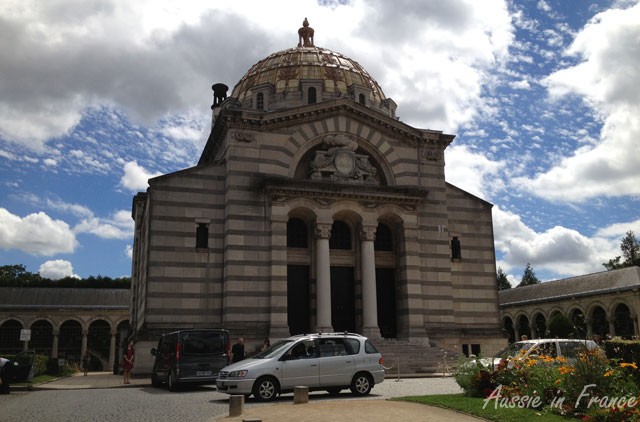
Not that I’ve been to a lot of crematoriums – or burials (inhumations) for that matter, I’m pleased to say, despite my age. In France – and this is borne out by IPSOS, the national survey institute – the trend is definitely towards cremation.
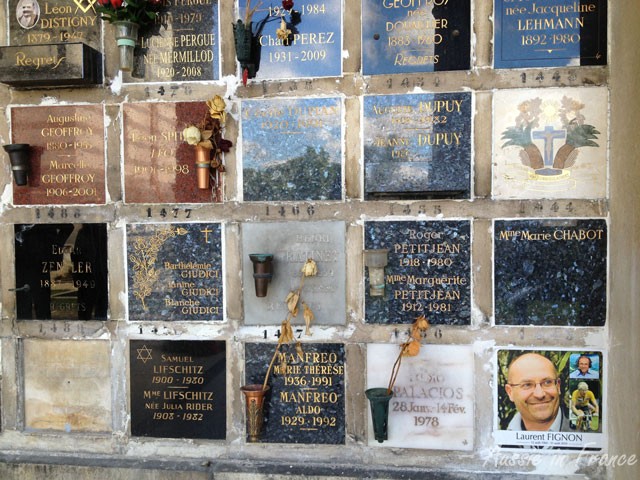
The nicest crematorium I’ve been to is Père Lachaise. An English friend’s mother was cremated there last summer. Given its celebrity, I would have imagined that it would be restricted to people living in the area, but apparently not.
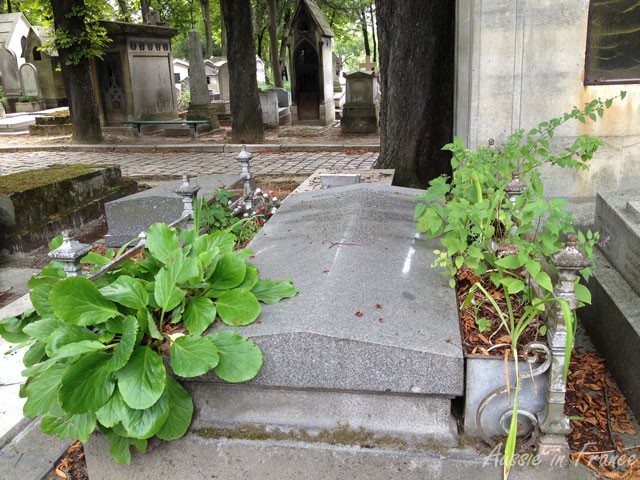
Before the ceremony, we wandered around the surrounding graves and it felt very calm and peaceful.
But I’m getting sidetracked. Another word used in relation to crématorium is columbarium from the word colombe which means dove. The columbarium is a wall with lots of little niches in which urns can be stored. The first time I heard the word was in the Cinque Terre where cremation is preferred to burial due to lack of space.
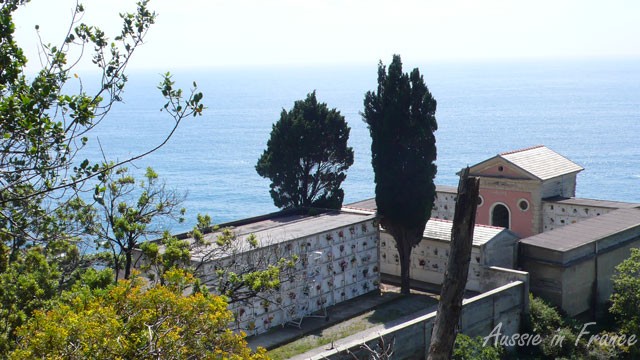
I don’t know about other countries but in France, you can’t just do anything with a person’s ashes (cendres). If you wish, you can disperse them in a site cinéraire in the crematorium, sometimes called a jardin de souvenir. If you’d like the ashes to be dispersed at the foot of a tree or shrub, it’s called mémorialisation.
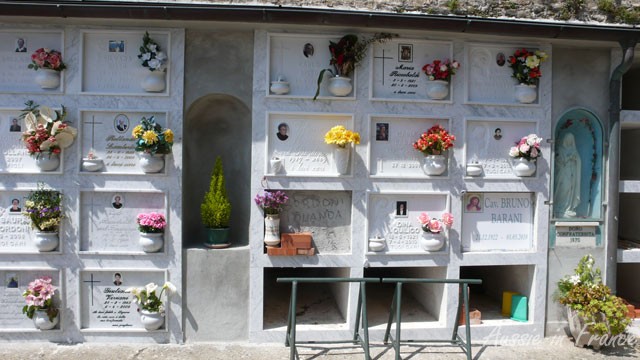
Outside the crematorium, ashes can’t be dispersed near a place of residence, so that rules out private gardens. Larger areas such as forests and meadows are possible, provided you have the owner’s authorisation. Dispersing them at sea is fine if you respect maritime law. You have to declare that the ashes have been dispersed at the town hall of the person’s birthplace.
You can bury the urn containing the ashes on private property if you obtain autorisation from the préfet first.
I found all that information in a little brochure at a crematorium in Greater Paris.

Everything you wrote is absolutely true… However we are in France 🙂
My dad passed away 2 years, and a few days, ago. He was incinéré (crematé -or anything créma???- do not exist…) and we took him home. My mum picked up a nice urn, and dad is in the living room now and nobody can guess what is in this nice pot. We are happy with that, as it was out of question to disperse his ashes.
Who cares about what is legal, or not? It was my dad and nobody is going to tell us (my mum, my sister and myself) what to do with what remains of him, that’s not a State matter. Besides, I am pretty sure no judge will ever dare to punish us in any way shape or form.
So as a matter of fact you do what you want, after all who is going to check what you do with this urn you can carry in a small supermarket bag?
I miss my dad, and it conforms me to know I can get close to him and give a little kiss at this nice jar in my mum’s house whenever I want…
Thank you, Ago, for sharing your experience with us. Actually, from what I understand, as long as the ashes stay in the urn, there is no problem. I imagine that the law was passed to avoid mishaps. Yes, the verb in English is “to cremate”. I was not brought up in a town where cremation was common so the whole idea is a bit foreign to me. I’m glad you get such comfort from the presence of the urn in your mother’s house.
In my mind I always compare the cremation/incineration thing to the feel of “centre de réeducation” and “rehabilitation facility”. In the other language, the term sounds so wrong! In French, “crématoire” also has this awkward connection to nazi German camps (fours crématoires)… My grandmother was incinérée in the North of France three years ago and the word “cremation” wasn’t mentioned once. I’m wondering – have you noticed this new term very recently?
PS. Laurent Fignon is dead? I had no idea!
PPS. I’m still in Paris and thought of you today when I wanted to get off at Palais Royal, but the metro station was closed…
Interesting about rehabilitation. I might have to do a post on that one! I hadn’t heard of crémation in French either but when I was looking for statistics on cremation on the IPSOS site, I noticed they were using it so I checked further. Laurent Fignon died in 2010. I didn’t know either.
I wonder why the Palais Royal was closed? They were redoing the Kiosque des Noctambules side the last time I took the metro. I hope you’ve been enjoying Paris.
Very interesting post as ever. For once I knew most of this stuff, except the colombarium. We visited an ancient colombarium years ago in the south-west — one of these abandoned ruins, with a faded info board. At the time I assumed it was a dovecote, but now you’ve got me wondering.
We’ve been to two funerals in France — one an interment, one a cremation. The cremation included a very matter of fact bricolage part where the garde champêtre sealed up the marble surrounding the urn with the ashes. The interment included a church service with familiar hyms sung to unfamiliar tunes. I only recognised them because I recognised the words.
Anyone can be buried in Pere Lachaise and Montmartre cemeteries because they are secular businesses, not religious. Paris and London both allowed the establishment of big public cemeteries in the 19th century and they are wonderful repositories now of history and wildlife.
Hi Susan, to add a bit more vocabulary here “enterrement” is commonly used to designate the whole ceremony (funerals in english I think)… I know people are using both but Rosemary is right “inhumation” is the word “L’inhumation consiste à placer le corps du défunt dans une tombe”.
Another word related to the subject is “funérarium”, french for ‘funeral home’, a place -outside home- where people gather to see the defunct before the funerals.
We had (because of modern life it tends to disappear) a tradition in France to have a lunch/dinner with all the relatives and close friends after the “enterrement” as this tragic event was, and still is, a family gathering… It is a way to remember the person, and give some confort to the family. In France food is everywhere….
We were invited back to the home of our friend whose mother was cremated at Père Lachaise but not after the other two cremations. It’s called a wake in English.
The three cremations I’ve been to hear were all very different. The first one, for a friend I went to university with in Paris, was a bit spooky. At the end, they opened up a large door and the coffin sort of sailed through. The only ceremony was a little impersonal. At Père Lachaise, interestingly enough, the person running the show spoke English. It was a very warm ceremony, with singing and personal tributes from the daughter and grandchildren. The coffin was taken discreetly through a side door. We all signed a book at the end. However, at the cremation we went to a few days ago for one of Jean Michel’s colleagues, attended by about 200 people, there was a sort of religious homily which surprised me. There was also guitar playing and a couple of personal tributes from the man’s son and daughter and best friend. The room wasn’t big enough for everyone so I sat outside in the foyer. I heard everything through the PA.
I don’t think I would have liked the garde-champêtre at the cremation you went to!